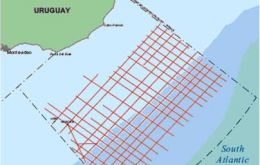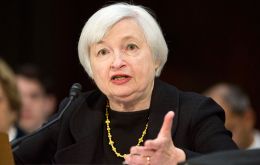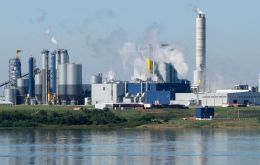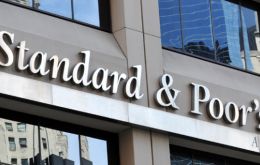MercoPress. South Atlantic News Agency
Economy
-
Friday, June 20th 2014 - 07:21 UTC
After all: Argentina seems willing to start discussions with Griesa and hedge funds

After a day of fury and discussions with cabinet members, advisors and experts, Argentine president Cristina Fernandez will be sending a government delegation to New York to meet Judge Thomas Griesa and the hedge funds holdouts' solicitors and begin, hopefully, a round of negotiations to reach a settlement on the bonds litigation.
-
Friday, June 20th 2014 - 06:50 UTC
Uruguay advances details of third oil and gas bid round Punta del Este basin

Uruguay has released a draft map of four ultra-deepwater and seven shallow-water blocks in the Punta del Este-Atlantic basin that will be on offer in the country’s third oil and gas bid round next year, officials said in Moscow this week, according to the oil and gas site Upstream.
-
Friday, June 20th 2014 - 06:42 UTC
Argentina's Supreme Court loss may serve as a wake-up call

The following piece by Charles Lane published in the The Washington Post offers an interesting debate about future bailouts and sovereign debt restructuring, following on Argentina's case.
-
Friday, June 20th 2014 - 06:34 UTC
Colombia-Brazil consider closer links between Pacific Alliance and Mercosur

Colombia and Brazil's presidents Juan Manuel Santos and Dilma Rousseff met in Brasilia to address regional and bilateral affairs and the possibility of closer links between the Pacific Alliance and Mercosur, which “are naturally complementary and do not compete among themselves”.
-
Thursday, June 19th 2014 - 18:33 UTC
Argentina says June 30 bond service in New York was made 'impossible' by lifting 'stay' order

Payment of bond service due on June 30 in New York has been made “impossible” by Wednesday's lifting of a stay by a U.S. federal court, Argentina's economy ministry said on Wednesday, in a move that appeared to push the country closer to default.
-
Thursday, June 19th 2014 - 06:09 UTC
Fed cuts US growth forecast, but will also further trim stimulus program

The US Federal Reserve has cut its growth forecast for 2014 because of the harsh winter weather. The central bank is now predicting growth of between 2.1% and 2.3% for this year, down from its March forecast of 2.8% to 3%.
-
Thursday, June 19th 2014 - 02:26 UTC
Griesa does not trust Cristina Fernandez and condemns the word “extortionist”

US Judge Tomas Griesa said on Wednesday that the televised speech delivered by President Cristina Fernández on Monday after the US Supreme Court declined to hear an appeal by Argentina in its battle against the holdouts was “a problem” for negotiations and implied he did not trust the Argentine leader.
-
Wednesday, June 18th 2014 - 08:31 UTC
Uruguay economy growing at a slower pace: imports up; exports stagnant

Uruguay's economy expanded 2.4% in the first quarter compared with the same 2013 period, but contracted 0.4% compared with the fourth quarter of last year, the central bank said this week. However deceleration is a fact since growth of the first quarter in 2013 has gone up 4.6% over 2012.
-
Wednesday, June 18th 2014 - 08:15 UTC
Falklands gas condensate discovery shows potential for wider distribution

Borders & Southern Petroleum PLC said on Tuesday that new data on the Darwin gas condensate discovery in the Falkland Islands show the potential for wider hydrocarbon distribution.
-
Wednesday, June 18th 2014 - 08:09 UTC
S&P and Argentina in six months: “default or distressed debt exchange”

Standard & Poor's cut its rating of Argentina's long-term foreign currency debt rating to CCC- from CCC+ with a “negative” outlook. A CCC rating is defined as “currently vulnerable and dependent on favorable business, financial and economic conditions to meet financial commitments,” according to S&P.
